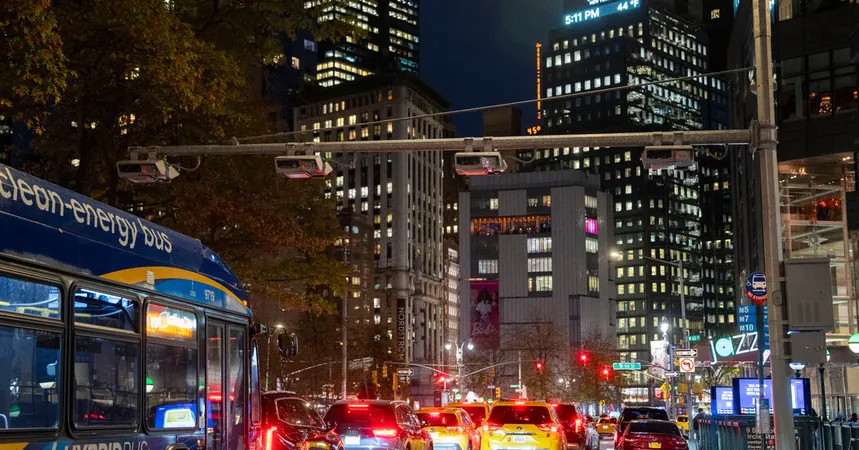
Major Legal Win for New York's Congestion Pricing: Will It Change the Face of Urban Transport?
2025-01-04
Author: Ting
Overview of the Ruling
In a significant victory for New York, a federal judge has dismissed New Jersey’s emergency request to block the implementation of the city's controversial congestion pricing plan, set to charge most drivers $9 for entering Manhattan's busiest areas. This ruling clears the way for the program to commence this Sunday, signaling a pivotal moment in urban transit management.
Reactions from Key Officials
Janno Lieber, Chief Executive of the Metropolitan Transportation Authority (MTA), expressed relief at the judge's decision, stating, "It’s time to get to work making this new initiative a success for New York." The congestion pricing strategy aims to mitigate traffic congestion and lower harmful vehicle emissions while raising critical funds, anticipated to be around $15 billion, for enhancements to New York’s transit infrastructure.
Inspiration from Global Models
This innovative tolling system draws inspiration from successful models in London, Stockholm, and Singapore, making it the first of its kind in the United States. The backdrop of this ruling is marked by fierce legal battles; New Jersey’s lawsuit has been seen as a major hurdle for the program, amid concerns it may be challenged further by the incoming presidential administration.
Legal Challenges and Future Implications
Randy Mastro, the attorney representing New Jersey, has stated intentions to appeal the ruling, emphasizing that the fight is not over. Mastro has been vocal about the adverse impacts on New Jersey residents, particularly citing potential increases in pollution and traffic congestion in their communities due to altered driving patterns.
Political Context and Adjustments
Governor Kathy Hochul had previously postponed the program’s launch last June but revived it after her party's November elections. The $9 fee is a cut from an original $15 proposal. Hochul even offered New Jersey a financial settlement to withdraw its suit, a proposal that New Jersey Governor Philip D. Murphy ultimately rejected.
Judge’s Conditions and Concerns
While Judge Leo M. Gordon ruled against halting the pricing plan, he requested additional environmental assessments that could potentially influence the project's future. New Jersey officials took this as a partial win, highlighting their concerns about increased pollution, particularly affecting areas near the Hudson River crossings.
Courtroom Tensions and Observers
The courtroom was filled with environmental advocates and media, all eager to witness the proceedings. Tensions flared during the hearing, with verbal exchanges reflecting the significance of this legal standoff.
Implementation Details
Starting Sunday, drivers entering Manhattan south of 60th Street during peak hours will face a $9 fee, with exceptions for certain vehicles, such as emergency services. The MTA hopes that this revenue will be a game-changer for public transport, funding essential repairs and improvements not only in New York City but extending to its suburbs.
Ongoing Legal and Social Concerns
Despite the green light from the court, lingering uncertainties remain as legal challenges could continue, with the potential for federal intervention even after the program’s initiation. Advocates and supporters are urging leaders from both states to focus on effective implementation rather than prolonging debates.
Opposition from Workers
Opponents, including union representatives for emergency services, have voiced strong concerns about the toll’s impact on workers already burdened with low wages. "They want us to pay to come to work. That doesn’t make sense when your earnings are so low," lamented Oren Barzilay, president of the union representing thousands of emergency personnel.
Conclusion and Future Outlook
As the implementation date looms, many are watching closely to see whether New York’s congestion pricing plan paves the way for transforming urban transport, or if it spurs further legal battles that complicate a solution to one of the city’s longstanding challenges.
 Brasil (PT)
Brasil (PT)
 Canada (EN)
Canada (EN)
 Chile (ES)
Chile (ES)
 Česko (CS)
Česko (CS)
 대한민국 (KO)
대한민국 (KO)
 España (ES)
España (ES)
 France (FR)
France (FR)
 Hong Kong (EN)
Hong Kong (EN)
 Italia (IT)
Italia (IT)
 日本 (JA)
日本 (JA)
 Magyarország (HU)
Magyarország (HU)
 Norge (NO)
Norge (NO)
 Polska (PL)
Polska (PL)
 Schweiz (DE)
Schweiz (DE)
 Singapore (EN)
Singapore (EN)
 Sverige (SV)
Sverige (SV)
 Suomi (FI)
Suomi (FI)
 Türkiye (TR)
Türkiye (TR)
 الإمارات العربية المتحدة (AR)
الإمارات العربية المتحدة (AR)